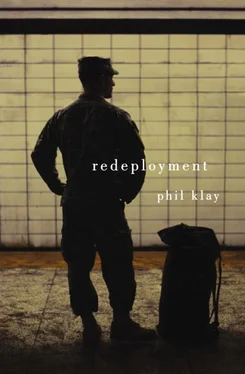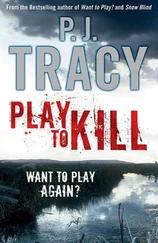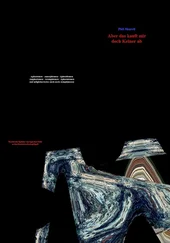Within an hour, I found myself cc’d on an e-mail to none other than Representative Gordon. Also cc’d were a host of military and civilian personnel. Chris Roper. Some brigadier general. Major Zima. And the colonel in charge of the BCT I was attached to. The sight of his name alone was enough to let me know I’d seriously screwed up. I was new to the cc game, a game played with skill by staff officers throughout the military, but I knew enough to know that the more senior people you could comfortably cc on your e-mails, the more everyone had to put up with whatever bullshit your e-mails were actually about.
The message began, “I am continually amazed by the lack of foresight I have found…,” and got uglier from there. Within five minutes, I had a new e-mail in my in-box, this from Lieutenant Colonel Roux, the brigade XO. It was addressed not to me, but to Major Zima. Roux hadn’t been cc’d on the initial e-mail, but scanning down through the document, I saw the colonel had forwarded it with the terse message “Jim. Deal with this.”
Lieutenant Colonel Roux was not quite as laconic. His message read, “Can someone explain to me why the Colonel is getting cc’d on angry letters to members of Congress? I want this unfucked. Now.” Below that was his signature block: “Very Respectfully, LTC James E. Roux.”
I started sweating over a response e-mail to the XO. It seemed important to convey the sheer idiocy of G. G. Goodwin, and I wasn’t sure I had the skill to get it across. But before I’d even put down the first paragraph, Major Zima beat me to the punch with what was clearly the right reply. “Sir,” it read, “I’ll handle it immediately.”
Five minutes later came another e-mail, this also from Major Zima. Lieutenant Colonel Roux and I were cc’d, as was the congressman and the random brigadier general, but not the colonel.
“Sir,” it began. “There’s been a little miscommunication on our part. I actually just finished talking with a schoolteacher who would be glad to take the uniforms and teach the children baseball.”
That seemed highly unlikely, but Major Zima went on to give a rather dizzying account of all the logistical hoops he was jumping through to get the project fast-tracked.
The e-mail continued: “We talked about having the children write you thank-you notes, but unfortunately most children in our area of operations are illiterate.” Then Zima urged patience, using Gene Goodwin’s very own reference to Japan as an example. He explained how baseball was actually introduced in 1872 and took about fifteen years to become firmly entrenched in Japanese culture. This bit was surprisingly long and technical, which made sense, since it turned out Zima had simply copied and pasted the Wikipedia entry for “Baseball in Japan” right into the text to make it seem like he was as engaged with the sport as Gene himself.
A little later, another e-mail popped up, this one strictly from Zima to me, no one else cc’d.
“Hey, Nathan,” it read. “Maybe you should let me handle this guy. No need to kick the hornets’ nest.”
• • •
About two weeks later,I ran into Major Zima doing push-ups in his cammies. Between grunts, he told me that if I wanted to start funding repairs for the water plant, the ministry wouldn’t go out of their way to roadblock us or steal more than the usual amount of reconstruction dollars.
“How many dollars are we talking?” I said. “Didn’t we already sink 1.5 million dollars into it?”
He stopped, put a cheerful grin on his face, and said, “Yep.”
“Where’d that money go?”
“I don’t know,” he said, dropping down for another push-up, “I wasn’t here then.”
I watched him for a bit. His torso was round enough that even with his arms fully extended, his belly was still hovering less than an inch above the ground. He dropped down and used his stomach to trampoline back up. I said, “How’d you get them to agree?”
“Seventy-nine,” he said. “Ahhhhh… . Eighty!”
He collapsed to the ground. There was no way he’d done eighty push-ups. My guess was closer to twenty-five. He looked up.
“I told them what you told me,” he said between big breaths, lying belly down on the ground with one cheek in the dirt.
“What did I tell you?”
“That if we turned on the water, it’d make all the Sunnis’ toilets explode.” Zima slowly rolled onto his back. “Ahhhh,” he said.
“And that was enough?”
“No,” he said. “But they double-checked and it turns out you’re right. Those pipes are designed off the Nasiriyah Drainage Pump pipes, so they’ll push out twenty cubic meters a second. That’s way too much. There’s something that you need to reduce the pressure. I forget what it’s called.”
“A pressure reducer?” I said.
“Yeah, a pressure reducer,” he said. “We’re not building that.”
“You told them the United States would purposely destroy all the plumbing in a Sunni community in order to get the water plant on line.”
“Yep.”
“And they believed you?”
“I told them I get promoted for completing projects, which is sort of true, and that the plant wouldn’t be operational until well after I was out of Iraq, which is definitely true, and that I wasn’t going to go through with the nine-hundred-thousand-dollar open-air market one of the ministry guys’ cousins is supposed to build for us if they keep cock-blocking us on water.”
I stared at the major in awe. Initially, I had thought the man stupid. Now, I wasn’t sure if Zima was brilliant or insane.
“But,” I said, “we can’t destroy a Sunni village… .”
“It’s okay,” he said. “For now, we keep moving forward. The Sunnis aren’t going to let overpressurized water destroy their homes. That’d be a silly thing to happen in the desert. They’ll keep track of it, even if we don’t.”
Zima’s confidence didn’t reassure me. “Do they know about the pressure?” I said.
“No,” he said. “But I put a reminder on my Outlook calendar for the week the BCT’s scheduled to leave Iraq. It says, ‘Tell Sheikh Abu Bakr that the pipes we built for him will make his house explode.’”
• • •
Sheikh Abu Bakr was,in addition to being an important item on Zima’s to-do list, a major player west of Route Dover. The first time I met him, the lieutenant commanding my convoy told me, “Sheikh Abu Bakr is, literally, Tina Turner from Mad Max .” Bob also claimed the sheikh was the man to see about widows, so a little after my water conversation with Zima, I headed out to try to get the beekeeping project off the ground. I needed to see Abu Bakr anyway, as we were shifting monetary support to the qada’a, or provincial council. Previously we’d given funds directly to him and he’d pay Iraqis to man security checkpoints instead of fight in the insurgency. Since Abu Bakr ran the qada’a, shifting payments to the council was somewhere between a shell game and a method of helping the Iraqis develop government institutions capable of managing budgets.
As we drove into town, I saw a couple of kids in baseball uniforms going through garbage on the side of the road. One kid was in gray, the other in blue. Blue had cut the leggings off to turn them into impromptu shorts.
“Stop the convoy,” I said. Nobody paid any attention, and I didn’t press the matter.
Given the squalor all around, I was always shocked coming to Abu Bakr’s home. It was an enormous estate, with five separate buildings and the only real lawn I’d seen in Iraq outside of the U.S. embassy. The creation of the embassy lawn had been ordered by the ambassador himself and had involved sod imported from Kuwait, armored convoys to bring in lawn supplies, intense efforts to keep birds away from the seed, and a casual disregard for the rules of nature. Estimates for the cost varied from two to five million taxpayer dollars. What Abu Bakr’s cost, I had no idea. Given the sheer number of pots he had his fingers in, it was likely U.S. taxpayer dollars had gone into his lawn as well.
Читать дальше












